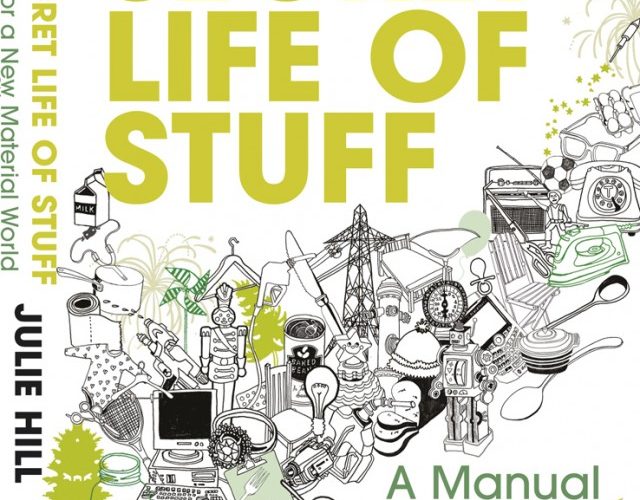The underlying message in Julie Hill’s book, The Secret Life of Stuff: A Manual for a New Material World, is one of conscious simplification. Not one to slap the wrists of consumers, she professes a love of shopping and the joy she gets from the perfect “find” for pennies. She does, however, question the ways in which we currently try to “green” our buying habits.
The underlying message in Julie Hill’s book, The Secret Life of Stuff: A Manual for a New Material World, is one of conscious simplification. Not one to slap the wrists of consumers, she professes a love of shopping and the joy she gets from the perfect “find” for pennies. She does, however, question the ways in which we currently try to “green” our buying habits.
Hill has spent most of her career in environmentally related fields. She was a director for the Green Alliance, worked on waste and product policy, served on the Environment Agency in the UK, and now works as non-executive director of the Eden Project.
She acknowledges that our society is blessed in many ways, but lacks the insight or environmental literacy to understand the consequences of rampant materialism. In Part One, she provides an idealized view of a possible future incorporating all the values so many of us strive for: community, compassion, and appreciation. The premise of the book is to demonstrate that this future is possible once we understand where our stuff comes from. Hill postulates that this understanding will lead consumers to make better choices. Unfortunately, this is directly contrary to the point she makes later that the contribution of green consumers is ineffective in making change. Still, the environmental Utopia that she initially describes provides the motivation to continue reading through pages and pages of somewhat dry, albeit necessary, information in hopes that a transformational action will be suggested.
In Part Three, Hill discusses the concept of environmental limits, where choice no longer comes into play, and base materials are no longer limitless. She traipses through the ideas posed in various other books and by various other authors to ponder what those limits might be.
Hill speaks briefly to the issues of food waste at a personal and a global scale, human excrement and green energy. Perhaps the most useful insight in this book is the need to eliminate demand for new things made from new materials. Along with moving away from a “zero-waste” paradigm to a “recovery” paradigm, she argues that we have to change our behaviours and attitudes about material things. Continuing to do the wrong things, even if they are more efficient, is not the answer.
The suggested change management strategies offered in this book are primarily aimed at government and legislative bodies, which makes sense, given the author’s background. She is hard on the green consumer, not because she doesn’t see value in their contributions, but because she feels they don’t have access to the necessary information to make truly informed choices. She takes us into the optimistic, environmentally ideal future and brings it all back to government and policy making. Taxes, product standards and responsibility, and global agreements are cited as being the most realistic and most useful approaches.
Still, while Hill argues that regulations put forth by governing bodies are more salient, and proposes that our “green” choices should be made for us, it is dangerous to underestimate the influence of green consumers as they can become be the driving force for government policy.
In the end, an optimistic commentary on responsible consumerism and ongoing education brings us back to choice in a material world. Recognizing the need for change, and starting the process of making only environmentally responsible options available for consumers, is just the beginning.
The Secret Life of Stuff, Julie Hill, London: Random House, 2011, 368 pages
Subscribe now to get more book reviews in your mailbox!
Reviewer Information
Jenn Marshman is an environmentalist who has worked in the health care industry since 1998. She is currently studying geography and environmental management at the University of Waterloo.












